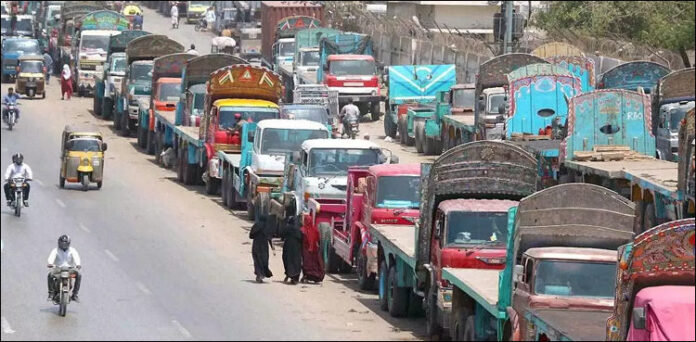KARACHI: The goods transporters’ strike entered the second day on Tuesday as the talks between Sindh Governor Imran Ismail and representatives of transporters ended in a deadlock.
Cargo supplies across the country came to a halt on Monday when transporters suspended their operations in protest over a hefty increase in fines, forcing the federal government to send in its top guns for holding talks to resolve the crisis.
Governor Imran Ismail, Punjab Governor Chaudhry Sarwar and PTI leader Jahangir Khan Tareen were given the task to woo the transporters.
Transporters said that they decided to halt the cargo supply as a last resort after their several appeals had failed to convince the authorities to take action on their concerns.
They said they paid millions of rupees in taxes and play a key role in the overall economic activity of the country but they were never taken on board by the government where the making of the recent policy was concerned.
“For instance, the government has changed the fine from Rs750 for every violation to Rs5,000,” said Agha Jawad Raza, a spokesman for the United Goods Transporters Alliance — an umbrella body of different goods transporters’ bodies.
“The transporters cannot afford this and the same was our stance from the very first day. From power corridors in Islamabad to authorities in the National Highways and Motorways Police (NHMP), we have been pleading [with] everyone for the last couple of months but in vain.
“We are left with no choice but to suspend our operation as part of a countrywide strike. Right now, more than 7,500 heavy vehicles involved in goods transport are parked in Kathore and Hawkesbay truck stand,” he said.
The federal government had recently approved revised rates of fines against traffic violations on highways. The penalty, which was Rs750 on every kind of violation, is now being categorised. For speeding, the fine would be Rs1,500 for motorbikes, Rs2,500 for cars, Rs5,000 for trucks, and Rs10,000 for public service vehicles.
On the other hand, the NHMP said that higher penalties on traffic violations were resulting in safer roads and lesser violations by the heavy traffic which most of the time caused fatal accidents.





The positive developments from NHMP initiatives in adherence to the UN/WHO Decade of Road Safety compliance in Pakistan with trucks from international destinations to and from Pakistan.
The honorable Governor initiatives are disciplinary moves for smooth flow of traffic of cargo/goods, perishables, refrigerated cargoes etc., to and from Sindh to destinations.
This positve move highly appreciable should be encouraged followed, with any controversies be discussed with Arbitration & Dispute Resolution amicably to the challenges in the regional conflicts and pray Allah for peace, harmony. The Climate Change policy will also bring rewards for operations on roads.
issues is not just the change of fine amount, the real issues is the power of police to demand more bribe now. till now transporters/citizens had started pay the actual reasonable fines, but this created problem for corrupt officials who had used the fines as mean for bribe and as more people were paying fines rather than paying bribes number of documented cases of violations have increases as well.
no body wants to pay hard earn money in fines even 500 is reasonable amount of fine to deter 99.9% of drivers for general violations but increase in fine creates perfect environment for increase in bribery /corruption.